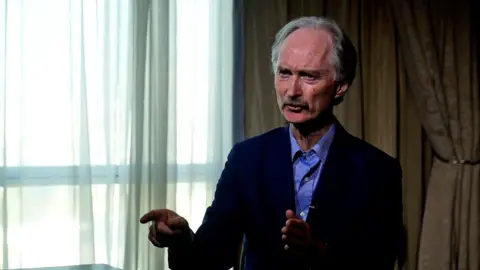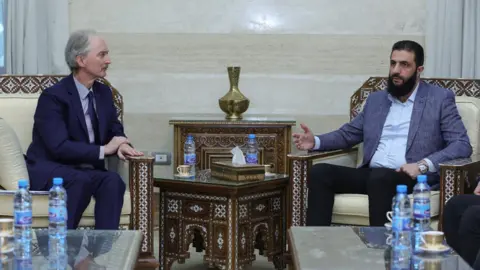 BBC
BBCIt is vital that Syria’s new leadership keeps its promises to respect the rights of all the country’s diverse religious and ethnic groups, according to UN Special Envoy Geir Pedersen.
Mr Pedersen, speaking to the BBC in Damascus, said Syrians were experiencing “a lot of hope and a lot of fear… at the same time”.
He called for all parties, inside and outside Syria, to do all they could to create stability in the country.
Bashar al-Assad’s regime was overthrown less than two weeks ago by a rebel coalition led by Hayat Tahrir al-Sham, known as HTS, a Sunni Islamist group that claims to have disavowed its jihadist extremist past since it split from al-Qaeda in 2016.
HTS is designated as a terrorist organisation by the UN, the US, the EU, the UK and others.
Symbolically, its leader has dropped his wartime pseudonym of Abu Mohammed al-Jolani and reverted to his real name of Ahmed al-Sharaa.
Sunni Muslims are a majority in Syria, which has a strong secular tradition. Sharaa insists HTS is a religious nationalist movement prepared to tolerate other groups.
Mr Pedersen said Sharaa has said “many positive things”. But some Syrians, he said, did not believe the HTS leader, who until 2016 had a long history as a jihadist extremist.
“I must be honest. I’m hearing from many Syrians that they’re asking questions whether this will actually be implemented. They’ve got their doubts.”
That, he said, was not surprising, given the speed of change in Syria.
“If the transition is to succeed, this needs to be a process that is co-operative.”
“[Sharaa] needs to work with the different armed factions that went in together with him. He needs to work with a broader group of former opposition. He needs to make sure that he’s working with a broad group of civil society women. And as we all agree with the broadest spectrum possible of Syrian society.”
Mr Pedersen, who has been the UN special envoy since 2018, said the international community was ready to help and support Syria’s new leadership.
He emphasised that hopes of lifting sanctions on Syria and taking HTS off the terrorist list depended on its behaviour.
He hoped to give it the benefit of the doubt for three months – the time HTS has said its interim government will rule before a more long-term arrangement.
“I think there is an understanding that for Syria really to be successful, we need to see a delisting, and we need to see sanctions lifted. But I think also it’s very important that it’s understood that this will not just happen because everyone wants positive things.”
“Member states are following very carefully what will be happening on the ground, but I do believe that if what has been said in public is actually being implemented in practice, yes, then I think we can see the delisting and the end of sanctions.”
 SANA
SANAAs for Syria’s neighbours, Mr Pedersen said that Israel’s actions since the fall of Assad had been “highly irresponsible”.
Since the 1967 Middle East war, Israel has occupied and later annexed the area of southern Syria known as the Golan Heights. Most other states, other than the US, consider the Golan to be occupied land.
Israel’s current bombing campaign against Syrian military facilities and its occupation of more Syrian land in the Golan Heights demilitarised buffer zone and neighbouring areas were, Mr Pedersen said, “a danger to the future of Syria, and these activities need to stop immediately”.
“There is no reason that Israel should occupy new Syrian territory. The Golan is already occupied. They don’t need new land to be occupied. So what we need to see is that also Israel acts in a manner that don’t destabilise this very, very fragile transitional process,” he added.
Mr Pedersen is also concerned about the complex web of power in northern Syria.
Turkey has a well-established relationship with HTS. It has troops in the north-west, as well as a militia known as the Syrian National Army (SNA), made up of rebel factions that it backs.
Since Assad was overthrown, the SNA has attacked the other force in Syria’s north, a Kurdish-led militia alliance called the Syrian Democratic Forces (SDF) which is supported by the US.
Mr Pedersen said it was Turkey’s interests to follow certain key principles, along with other foreign powers.
“What is it that we all need to see in Syria now? We need to see stability. We need to see that there are not new population groups that are displaced. We need to see that people are not running away from Syria as refugees. We need to see that refugees are returning, that… internally displaced can be returning to their homes.”
After 54 years under the rule of two authoritarian Assad presidents, Syria is fragmented, with towns and villages heavily damaged by almost 14 years of war and a population traumatised by war and the deadly cruelty of the regime.
Mr Pedersen said it was vital for HTS to start a process that will bring justice to all the families of more than 100,000 Syrians who disappeared after detention by the regime since 2011. Most are presumed dead.
“If this process is not moving in the right direction, there is a huge danger that this anger can erupt in a manner that is in no one’s interest.”
Syrians, Mr Pedersen said, wanted to own the process of rebuilding their country. That might be difficult given the turbulence across the Middle East and propensity of Syria’s neighbours and other big powers to interfere.
Time is short. If HTS keeps its promises, “within the next few weeks and months there is hope that Syria can have a bright future”, he said.
He warned that if that doesn’t happen, “there is also a danger of new strife and even civil war.”
“But we need to bet that the future for Syria can now be fixed. And that we can start the process of healing.”

